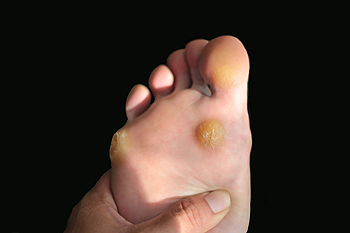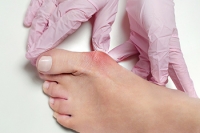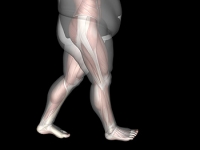 While similar to a callus, corns are harder, smaller, and generally more painful thickened layers of the skin that appear as small lumps on the feet and toes. Typically caused by irritation and friction, corns can be incredibly uncomfortable to deal with if left untreated. To avoid getting a corn, it’s recommended that you wear footwear that gives your toes room to move freely in, you keep your feet clean and moisturized, and you keep your toenails properly trimmed. To help treat corns, it’s often advised that you soak your feet in warm water before filing at it with a pumice stone. Moisturizing after filing and using corn pads may also help to reduce your corn. If your corn is extremely painful, causing swelling, redness, or drainage of pus, we recommend that you consult with a podiatrist as soon as possible for professional care and treatment.
While similar to a callus, corns are harder, smaller, and generally more painful thickened layers of the skin that appear as small lumps on the feet and toes. Typically caused by irritation and friction, corns can be incredibly uncomfortable to deal with if left untreated. To avoid getting a corn, it’s recommended that you wear footwear that gives your toes room to move freely in, you keep your feet clean and moisturized, and you keep your toenails properly trimmed. To help treat corns, it’s often advised that you soak your feet in warm water before filing at it with a pumice stone. Moisturizing after filing and using corn pads may also help to reduce your corn. If your corn is extremely painful, causing swelling, redness, or drainage of pus, we recommend that you consult with a podiatrist as soon as possible for professional care and treatment.
Corns can make walking very painful and should be treated immediately. If you have questions regarding your Feet, contact Brent Harwood, DPM of Southeast Podiatry. Our doctor will treat your foot care needs.
Corns: What Are They? And How Do You Get Rid of Them?
Corns are thickened areas on the skin that can become painful. They are caused by excessive pressure and friction on the skin. Corns press into the deeper layers of the skin and are usually round in shape.
Ways to Prevent Corns
There are many ways to get rid of painful corns such as:
- Wearing properly fitting shoes that have been measured by a professional
- Wearing shoes that are not sharply pointed or have high heels
- Wearing only shoes that offer support
Treating Corns
Although most corns slowly disappear when the friction or pressure stops, this isn’t always the case. Consult with your podiatrist to determine the best treatment option for your case of corns.
If you have any questions please feel free to contact one of our offices located in Fairhope, Brewton, and Atmore, AL . We offer the newest diagnostic and treatment technologies for all your foot care needs.
Read more about Everything You Need to Know About Corns







